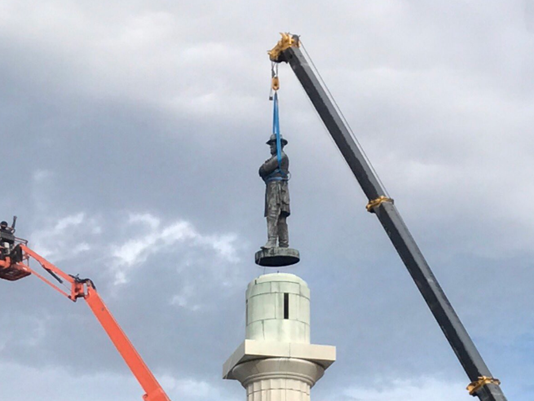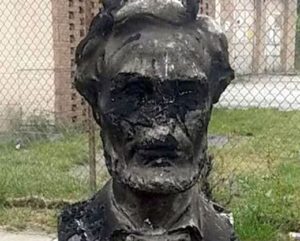
In 1884, 19 years removed from the intense passions of the brutal interlude of the American Civil War, an illustrious crowd led by Confederate royalty, including the former President of the Confederacy, Jefferson Davis, the Confederate General Beauregard, and two daughters of General Lee, saw the dignified and solemn statue of the Confederacy’s most famous general dedicated in New Orleans. The statue survived on its pedestal through the twentieth century and many re-interpretations of the causes and principles of the struggle, and levels of veneration of the reluctant general who vigorously led the South in battle. The statue on its 107th birthday was placed in protected status on the National Register of Historic Places. Rising nearly a hundred feet over New Orleans, its was one of the more recognizable and representative historical structures in the city.
On May 19th, 2017, the monument to the South’s peculiar cultural identity and tragic mis-direction was taken down, as the city’s government’s final success in removing Confederate historical figures from the city.
New Orleans’ drive to expunge its connection with secessionist history injected momentum across the United States to find ‘inappropriately venerated’ historical monuments and expunge them and perhaps what they teach us about ourselves , from our consciousness. The focus by self interested groups on the left to roust out such history accelerated after the events of Charlottesville, and have led to less civilized and more aggressive removal and destruction of similar monuments. As with all movements where the original logic for the actions shift with the political motivations of the activists, the destructive eye now points toward previously uniting monuments

to the American story such as the Jefferson Monument and Mt. Rushmore. The radical aggression has spilled beyond the country’s founders to the very base disgust the radicals feel for anything that defines America, such as Christopher Columbus and yes, Abraham Lincoln.
Really. Abraham Lincoln.
We are living through a dangerously anti-historical time, when the extent and meaning of events, so formative in how we became, are being evangelistically eradicated by those with little sense of history and a real hatred of who we are. It is nonsensical to not understand that monuments are often erected to highlight what people have seen over years to be enduring and important, rather than any pretense that these individuals represented were without flaw. Robert E. Lee is venerated for the way he led men, not for the fractured logic of his divided loyalties. Thomas Jefferson elevated for all time the principle of individual rights and the expressed equality of man, not his own timid, very human inability in his time and culture to live up to his own principles. The many representations of a heroic southern sacrifice do not celebrate the horrid culture of slavery, but of an epic, crushing struggle that left a million dead, nearly twice as many as in World War II, in a country a third as populous. In the profound battle to end the wretched scar of American slavery hobbling a society founded on equality and freedom, the passions that drove one side to the righteous, and the other to a doomed and inhonorable and erroneous principle, were complex and inexorable. Tearing down history, without recognizing its ability to teach, encourages the very close minded processes that led to such passions in the first place.
That said, history and our human story is too imbued within us to fall silent when facing the the poorly chosen specific statue or monument. Heroes are etherial and not locked in their time. A statue to Roger Taney or a George Wallace are not time heroic. There is no feasible need to teach their inhumanity, regardless of their skills, that suggests any need for their continuing memorial existence. A modern society can reflect upon its heroes and determine their relevance soberly, and cull with care. We needn’t feel sentimental justifying a particular malevolence, because of a peculiar skill. There is justice in removing a Hussein or Stalin from the pedestal, once their own societies have identified the hypocrisy of their veneration.
Yet the danger always resides in the zealous nature of our own perceived purity and our unwillingness to register our humility in judgement of others. Could it be possible that we could even learn from a Nathan Bedford Forrest?
Civil war, such as you have just passed through, naturally engenders feelings of animosity, hatred, and revenge. It is our duty to divest ourselves of such feelings, and, so far as it is in our power to do so, , to cultivate feelings toward those with whom we have so long contested and heretofore so widely but honestly differed. Neighborhood feuds, personal animosities, and private differences should be blotted out, and when you return home, a manly, straightforward course of conduct will secure the respect of even of your enemies. Whatever your responsibilities may be to government , to society, or to individuals, meet them like men, The attempt to establish a separate and independent confederation has failed, but the consciousness of doing your duty faithfully at to the end will in some measure repay for the hardships you have undergone.
LT. General Nathan Bedford Forrest to his soldiers
May 9th, 1865
Before we tear it all down, maybe we should hear out all the strains of history, and find the better angels of our nature.